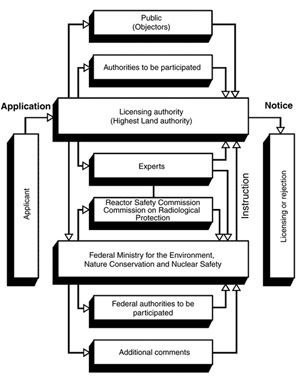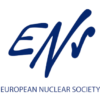The license for the construction and operation of a nuclear facilityFor the application of liability regulations, the Atomic Ene... is to be applied for in writing before the licensing authority of the Federal State in the Federal Republic of Germany where the facility is to be erected. The documents required to examine the licensing prerequisites, in particular a safety reportNuclear facilities must be designed such that the protective... allowing third parties to evaluate whether their rights might be affected by the effects resulting from the facility and its operation must be included with the application. The safety reportNuclear facilities must be designed such that the protective... shows the fundamental design features, the safety-related design principles and the function of the facility including its operating and safety systems. If the documents required for the design are complete, the licensing authority is required to announce the project in its official gazette and in addition in the local papers published in the region of the facility site. During a two-month periodreactor period, the application, safety reportNuclear facilities must be designed such that the protective... and a brief description of the facility are to be made available for public inspection at the licensing authority and at the site of the project. Objections may be raised in writing at the licensing authority during the term for public inspection. Upon expiry of the term of public inspection, all objections that are not based on special private titles are excluded. The licensing authority is required to verbally discuss the objections with the applicant and the persons raising the objections. The discussion datePursuant to the provisions in the nuclear licensing procedur... is used to discuss the objections as far as this is important for the examination of the licensing prerequisites. The discussion datePursuant to the provisions in the nuclear licensing procedur... provides the opportunity for the persons raising objections to explain their objections. In examining the application the authority is assisted by independent experts. As a rule, these are the Technical Inspection Agencies, the Company for Industrial Plants and Nuclear SafetyThe GRS – Gesellschaft für Anlagen- and Reaktorsicherhe... and other institutions such as the German Meteorological Service and experts from university institutes and research facilities. Upon receipt of a licensing application, the licensing authority of a Federal State informs the Federal Ministry for the Environment, Nature Conservation and Nuclear Safety. This ministry supervises the licensing activityActivity is the term used to characterise the number of nucl... of the Federal state authority, requests necessary documents and obtains, if necessary, further opinions. The Reactor Safety CommissionThe Reactor Safety Commission (RSK - Reaktorsicherheitskommi... and the Commission on Radiological Protection assist the ministry as consultants. The competent Federal state authority takes a decision assessing the overall result of the procedure. The license may be granted only if
- there are no facts giving rise to reservations about the reliability of the applicant and the persons responsible for the erection, management and supervision of the operation of the facility and whether the persons responsible for the erection, management and supervision of the operation of the facility have the required expert knowledge for this purpose,
- the required precautions against damage resulting from the erection and the operation of the facilities have been taken in compliance with current scientific knowledge and state-of-the-art technology,
- the required financial securityThe administrative authority is required to fix the amount o... has been undertaken to meet legal liability for damages,
- the required protection against fault measures or other third party influences is ensured,
- essentially public interests, in particular regarding the cleanliness of water, air and ground, do not oppose the chosen site of the facility.
The persons concerned may appeal against the licenses granted before the Administrative Courts.

Course of a licensing procedure for nuclear facilities
